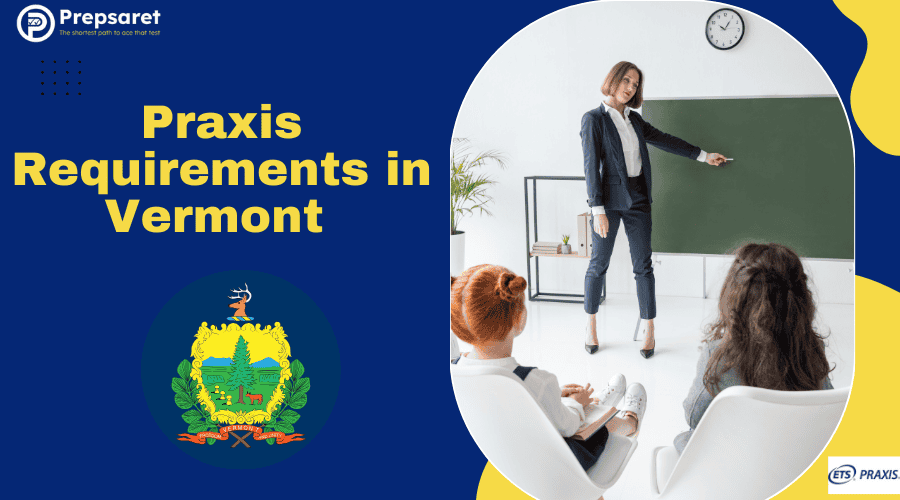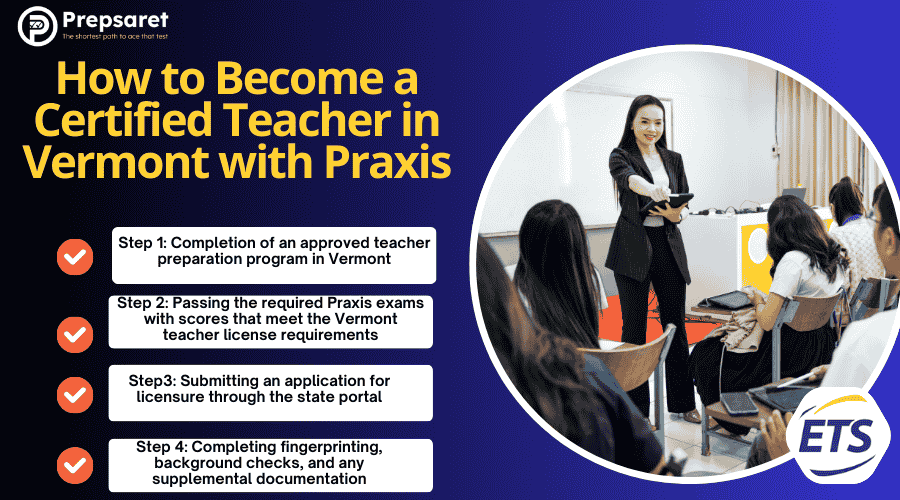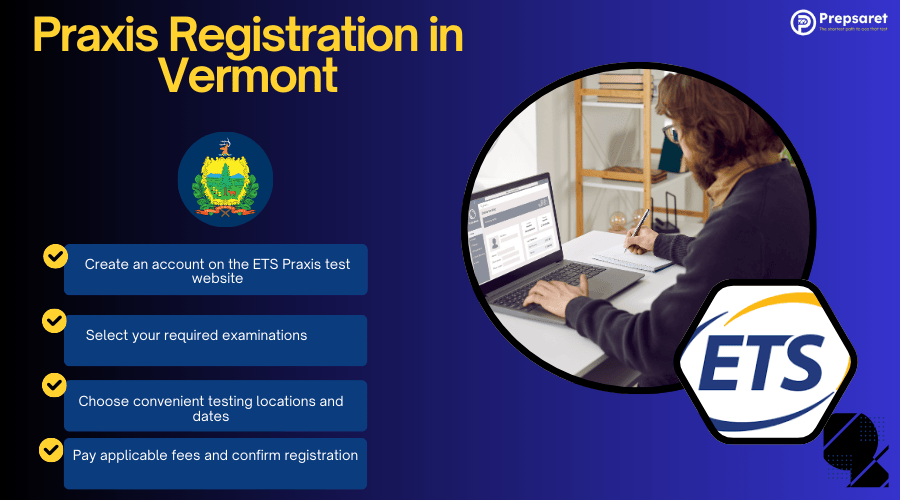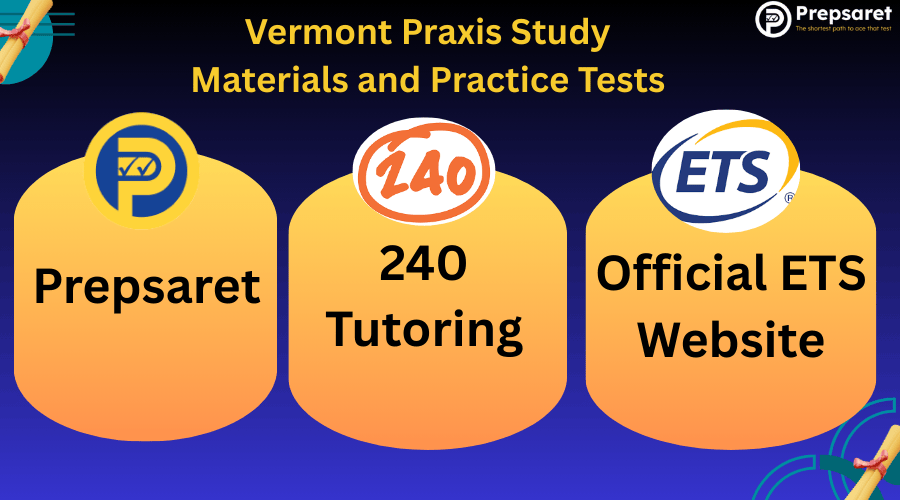Navigating the path to becoming a certified educator in Vermont starts with understanding the Praxis Requirements in Vermont. The Vermont Agency of Education mandates testing standards that all prospective teachers must meet.
These assessments ensure educators are equipped to support student learning effectively. Whether pursuing elementary, secondary, or specialized instruction, knowing these requirements is key to success.
This comprehensive guide will cover every aspect of the Praxis Requirements in Vermont. For targeted study tools and practice exams, Prepsaret’s prep materials can help you prepare with confidence and meet Vermont’s standards efficiently.
Do You Need the Praxis to Teach in Vermont?
Yes, Vermont teacher certification requires successful completion of specific Praxis exam Vermont assessments before you can obtain your teaching license. The Vermont teacher license Praxis score requirements are strictly enforced by the Vermont Agency of Education, making these exams non-negotiable for certification.
What Praxis Tests Are Required to Teach in Vermont?
Vermont takes a comprehensive approach to certification testing. Required Praxis tests for Vermont educators typically include:
- Praxis Core Academic Skills (Reading, Writing, Math) for most initial licenses
- Subject-specific Praxis exams based on your intended content area (e.g., Elementary Education, Secondary Science, etc.)
- Principles of Learning and Teaching (PLT) exams for most endorsements
Understanding these requirements early in your preparation process is crucial for planning your certification timeline effectively.
Overview of Vermont Praxis Test Requirements
The Vermont Praxis test requirements encompass multiple assessment categories designed to evaluate your readiness for classroom instruction. Vermont teacher testing includes both Praxis Core and Subject Test requirements in Vermont that candidates must successfully complete.
Praxis Core Academic
The core academic skills test evaluates fundamental competencies in:
- Reading comprehension and analysis
- Mathematical problem-solving and reasoning
- Writing mechanics and composition skills
Continue reading: Praxis Core Practice Test
Praxis Subject Assessments
Subject assessments focus on content knowledge specific to your teaching field, ensuring you possess a deep understanding of the material you’ll be teaching.
These Vermont teacher testing protocols align with national standards while addressing Vermont’s specific educational priorities.
Whether you’re pursuing elementary, middle, or high school certification, understanding these distinct testing categories helps you prepare strategically for success.
Praxis Requirements for Elementary Teachers in Vermont
What Praxis do I take for Elementary Education? This includes both the Core Skills and the Specialized Elementary Content assessments. Candidates for elementary education in Vermont face specific Praxis requirements that differ from those for secondary certification paths.
Required Exams for Elementary Certification
Candidates pursuing elementary licensure in Vermont must complete:
- Praxis Core Academic Skills for Educators (if required by your preparation program)
- Praxis Elementary Education: Multiple Subjects (5001)
- Any additional teacher licensure exams specified by Vermont
These assessments evaluate your ability to teach across multiple subject areas, as elementary educators typically handle diverse curriculum content.
Vermont teaching standards emphasize comprehensive preparation that ensures teachers can address students’ varied learning needs effectively.
Alignment With Vermont Teaching Standards
The Vermont teaching standards emphasize a broad, well-rounded instructional foundation. Candidates must show competency in:
- Mathematics instruction
- Reading and language arts
- Science fundamentals
- Social studies teaching strategies
By meeting the Praxis requirements for elementary teachers in Vermont, you demonstrate readiness to support diverse learners and deliver multi-subject instruction with confidence.
How to Become a Certified Teacher in Vermont with Praxis
Learning to become a certified teacher in Vermont with Praxis involves understanding the complete certification pathway. Teacher preparation programs in Vermont work closely with the state’s licensing requirements to ensure candidates meet all necessary standards.
Steps to Vermont Education Licensure
The typical pathway to Vermont education licensure includes:
- Step 1: Completion of an approved teacher preparation program in Vermont
- Step 2: Passing the required Praxis exams with scores that meet the Vermont teacher license Praxis score requirements
- Step3: Submitting an application for licensure through the state portal
- Step 4: Completing fingerprinting, background checks, and any supplemental documentation
- Step 5: Receiving either a provisional or initial teaching license
These steps ensure alignment with both national and Vermont teaching standards
Support Through Praxis Preparation
Most teacher preparation programs in Vermont incorporate dedicated support for Praxis exam readiness, including coursework aligned to test content. By combining professional mentorship and comprehensive study tools, candidates are more likely to succeed.
Working with experienced educators and utilizing proven resources such as Prepsaret’s Praxis prep materials can increase your chance of passing on the first attempt.
Praxis Registration in Vermont
Understanding the Praxis registration process ensures you can schedule and complete your required assessments efficiently. Where to take the Praxis test in Vermont depends on available testing centers and your specific exam requirements.
How to Register for Praxis Exams
Registration involves several key steps:
- Create an account on the ETS Praxis test website
- Select your required examinations
- Choose convenient testing locations and dates
- Pay applicable fees and confirm registration
This streamlined Praxis registration process ensures you can manage your testing journey confidently and on time.
Where to Take the Praxis Test in Vermont
Wondering where to take the Praxis test in Vermont? Testing centers are located across the state, often in major cities and university campuses.
Praxis Vermont candidates can check the ETS Praxis test site for up-to-date center information, accessibility options, and testing accommodations.
Planning your schedule early—especially during off-peak testing seasons—ensures availability and gives you more time for exam prep.
Praxis Passing Scores in Vermont
Praxis passing scores Vermont requirements determine whether you successfully meet certification standards. Passing Praxis scores by State vary, so understanding Vermont’s specific requirements is essential for your preparation strategy.
Minimum Score Requirements
Here are some of the required passing scores:
- Core Academic Skills: Passing scores vary by subtest (reading, writing, and mathematics), with specific minimum score requirements for each.
- Elementary Education: Multiple Subjects test requires passing scores that differ by subtest, typically around 155 to 159 depending on the subject area (Reading & Language Arts, Mathematics, Social Studies, Science).
- Subject-Specific Assessments: Passing scores vary depending on the content area and test, generally within the mid-150s to high-150s range.
Want to compare Vermont’s passing scores to other states? Download the Praxis Scores by State PDF for a national overview of required scores.
These Praxis passing scores Vermont standards align with national benchmarks while reflecting Vermont’s commitment to educational excellence.
Candidates who don’t achieve minimum scores on their first attempt can retake examinations, though additional fees and waiting periods may apply.
Comparing Vermont’s standards with other states helps you understand the rigor expected and plan accordingly for comprehensive preparation.
Related post: How Praxis Scoring Works
States That Do Not Require Praxis Exams: Vermont in Context
Although Vermont mandates Praxis assessments, comparing it to states that do not require Praxis exams can offer valuable insight especially if you’re considering teaching in other parts of the country.
Some states have chosen alternate certification systems, avoiding Praxis altogether. This contrast highlights the variation in state-specific Praxis requirements and emphasizes why educators should understand different certification frameworks.
Examples of Praxis Alternatives
States that don’t require Praxis exams often use:
- State-developed exams tailored to local standards
- Portfolio-based evaluation systems
- Alternative teacher certification pathways
- Different testing vendors such as Pearson
Vermont vs. Virginia Praxis Requirements
For instance, Virginia Praxis requirements are not identical to Vermont’s. This comparison illustrates how teacher certification standards even among neighboring states can differ greatly.
While Virginia uses Praxis for many endorsements, their cut scores and required exams may vary.
Why This Matters for Teachers
Differences in state-specific Praxis requirements directly impact:
- Teacher mobility
- Reciprocity agreements
- Licensing timelines
- Testing requirements for relocation
If you’re licensed in Vermont but plan to teach elsewhere, it’s essential to research the destination state’s requirements to determine whether additional testing or coursework will be needed.
Understanding these differences helps you make informed decisions about where to begin your teaching career and how to maintain flexibility for future opportunities.
Related Blog Post: Best Praxis Study Resources
Vermont Praxis Study Materials and Practice Tests
Effective preparation is key to passing your Praxis exams and practice testing is one of the most powerful tools at your disposal. Whether you’re aiming for your first attempt or improving a previous score, Praxis practice tests help you build confidence and identify knowledge gaps.
Understanding the full list of Praxis tests required for Vermont certification ensures you’re focusing on the right areas. Vermont’s requirements vary by subject and grade level, making targeted preparation essential.
Proven Praxis Study Strategies
- Taking multiple practice examinations under timed conditions
- Reviewing detailed explanations for incorrect answers
- Identifying knowledge gaps and focusing additional study
- Understanding score reporting for Praxis timelines and procedures
Score reporting for Praxis typically occurs within 10-16 business days for most computer-delivered tests, allowing you to plan retakes if necessary while meeting certification deadlines.
Check Out: How Long Do Praxis Scores Take?
Why Choose Prepsaret for Your Vermont Praxis Prep?
Prepsaret is your go-to platform for high-quality Praxis preparation tools designed to mirror the actual exam experience.
Whether you’re just starting your study journey or gearing up for a retake, using a Praxis practice test significantly boosts both your readiness and your testing confidence.
For a study experience that replicates real test conditions, Prepsaret provides:
- Full-length, timed Praxis practice test simulations
- Realistic test content aligned with official ETS guidelines
- Personalized progress tracking to measure your improvement
- Affordable prep plans designed specifically for future educators
With Prepsaret, you’re not just practicing, you’re preparing smarter. Join thousands of aspiring teachers who trust Prepsaret to help them pass their Vermont Praxis exams the first time.
Related post: Praxis Practice Test: Real Exam Questions for Praxis Core
Praxis Requirements in Vermont: FAQs
What Do You Need to Be a Teacher in Vermont?
Vermont requires completion of approved teacher preparation programs, passing Praxis scores, background checks, application for licensure, and meeting continuing education requirements for certification.
Can I Just Take the Praxis Without an Education Degree?
No, Vermont generally requires candidates to complete a state-approved teacher preparation program before their Praxis scores are accepted. Licensure is tied to both education credentials and successful exam completion under state guidelines.
What Praxis Exams Are Required for Elementary Education?
Elementary teaching candidates in Vermont must usually take the Praxis Core Academic Skills tests and the Elementary Education: Multiple Subjects (5001) exam, though requirements may vary slightly based on the chosen preparation program.
Can You Be Exempt From Praxis?
Some candidates may receive Praxis exemptions if they have advanced degrees, qualifying scores on other standardized tests, or extensive teaching experience, subject to Vermont Agency of Education review and official approval.
Which State Has the Hardest Teacher Certification?
Massachusetts, Connecticut, and New York often rank among states with most rigorous certification requirements, including high passing scores and comprehensive assessment batteries.
Conclusion: Preparing for Success with Praxis Requirements in Vermont
Successfully navigating Praxis Requirements in Vermont requires preparation, strategic planning, and understanding all certification components. The Vermont Agency of Education offers valuable support, but using trusted prep tools is just as essential.
Prepsaret provides high-quality practice tests and resources tailored to Vermont’s standards. Meeting these requirements is only the start—they ensure you’re ready to make a lasting impact in the classroom.
Prepare thoroughly, lean on mentors, follow official guidelines, and practice consistently. With focus and the right tools, you’ll meet all Praxis Requirements in Vermont and launch a fulfilling teaching career.




